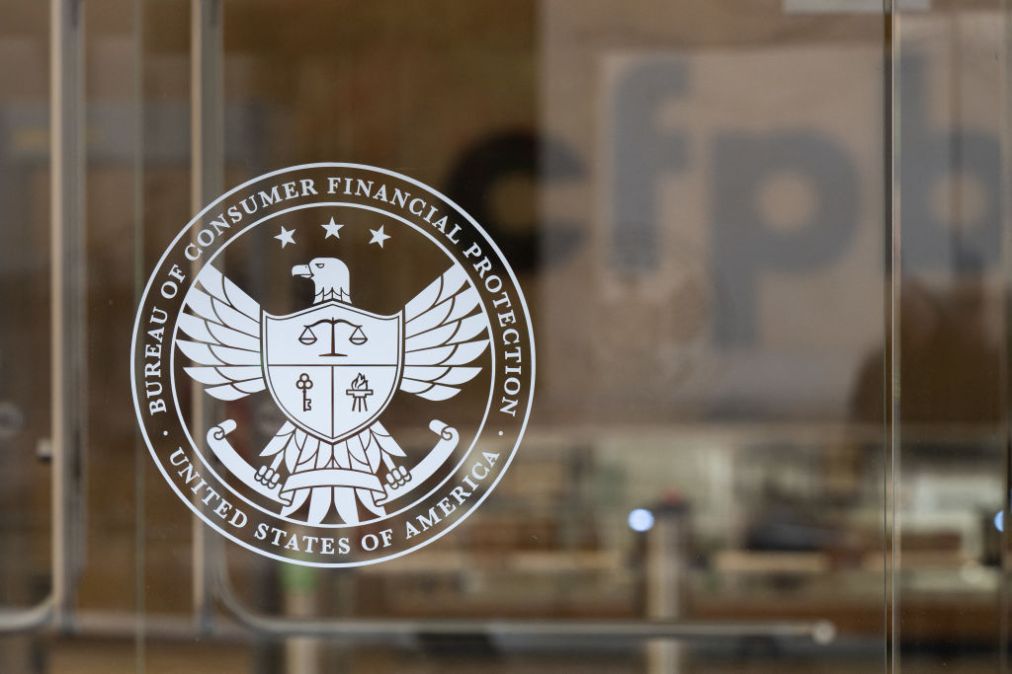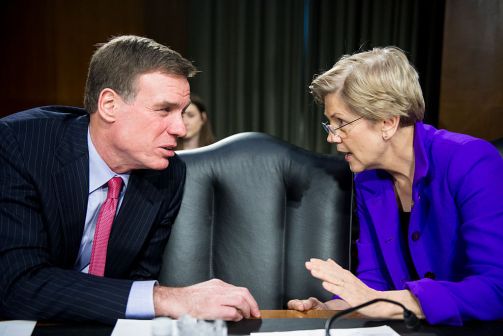Senate Democrats urge CFPB to ignore big banks’ interest in overhauling data rule

Top Senate Democrats are waging a last-ditch effort to stop the Consumer Financial Protection Bureau from reversing a rule that gives the public more control over their personal financial data.
In a letter sent Wednesday, Democratic Sens. Elizabeth Warren of Massachusetts, Ron Wyden of Oregon and Richard Blumenthal of Connecticut urged acting CFPB Director Russell Vought to reinstate the Personal Financial Data Rights rule, which required financial institutions to provide consumers and authorized third parties with access to their data at no cost.
The rule was enshrined under section 1033 of the 2010 Dodd-Frank Act and then expanded in October 2024 to include fee-free access to data on credit cards, payment apps, digital wallets, checking accounts and prepaid accounts. Third parties are required to obtain consent from consumers before sharing their financial data, and there are limits on how that data can be used.
Under Vought — the OMB chief who has overseen the Trump administration’s teardown of the CFPB since February — the agency opened an advanced notice of proposed rulemaking to reconsider the rule. The decision to do so has drawn strong rebukes from consumer groups and fintech firms, and support from leading banking industry groups.
The letter from Warren, ranking member of the Senate Banking Committee, Wyden, ranking member of the Senate Finance Committee, and Blumenthal nods to that advocacy-versus-industry dynamic.
“We are concerned that the Trump CFPB’s policymaking seems to be more driven by the see-sawing interests of big banks and other industry groups than with protecting consumers’ rights to their own data, as mandated by law,” the senators wrote. “We believe that the CFPB should reinstate the Personal Financial Data Rights rule promulgated in 2024,” adding that “any significant dilution of its requirements would likely violate the law.”
The lawmakers took particular umbrage in their letter with the no-cost provision in consumer access to their own data, writing that free access to personal financial information is “at the heart of the rule.” Absent that 2024 update, they wrote, “big banks have demonstrated that they intend to charge exorbitant fees for this data to choke off competition and concentrate this data in the hands of a few large incumbents.”
“It stretches the realms of plausibility to think that an average American could move or benefit from years of electronic banking records through massive data files without assistance,” the Democrats said. “Equally implausible is the belief that a third party could operate if it had to rely on its own customers to manually access, download, and provide their data.”
Scrapping the rule would also have the potential to stifle competition among startups and other competitors to big banks in the data-sharing market, the Democrats said. If large financial institutions regain a stranglehold over consumers’ data, they argue, then consumers will be presented with fewer choices and higher prices, “forced to rely on either these institution’s own products or the few that can afford the extraordinary access fees.”
Other concerns raised by Warren, Wyden and Blumenthal center on implications within the proposed rulemaking that CFPB intends to “unnecessarily restrict the types of third parties” that can serve as fiduciaries. The lawmakers make the case that the agency is operating here “under the guise of consumer protection,” when in reality a change of that kind would only serve to “cut out numerous legitimate third parties — such as fintech companies — from being able to access consumer data, to the benefit of big banks.”
In comments submitted to the CFPB last month, the American Fintech Council raised the same points, with the trade group’s head of policy and regulatory affairs writing that the agency’s current “standards-based opening banking policies” must be preserved so that the market “continues to grow in a way that benefits consumers, innovators, and the broader economy.”
On the GOP side of the aisle. Reps. French Hill of Arkansas and Bill Huizenga of Michigan, the top two Republicans on the House Financial Services Committee, wrote in a letter last week that the CFPB should be commended for its “efforts to ensure consumers can meaningfully control and use their personal financial data,” though they encouraged the agency to make sure the new rules still permit consumers to share their data with “authorized firms.” Data privacy and security rules, the House Republicans said, should comply with Gramm-Leach-Bliley Act frameworks.
Though the personal financial data rights rulemaking has generated plenty of interest, the CFPB is still headed for a shutdown, per recent comments from Vought. The Trump administration this week nominated one of Vought’s OMB deputies, Stuart Levenbach, to be the next CFPB director, though sources told the Associated Press that the move was intended to keep Vought in the acting role until the agency’s shuttering is complete.
The CFPB did not respond to a request for comment on the Senate Democrats’ letter by the time of publication.






